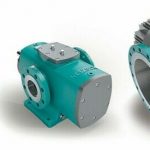To keep sea transport running, tank farms are located at crucial ports around the world. These oil terminals consist of a large number of tanks for storing fuel, among other substances. Owners of the tank farms often also rent out storage capacities – a company in Texas in the US is an example of this. Because fuel is so crucial for the global supply chains, reliable availability of the HFO (heavy fuel oil) and VLSFO (very low sulphur fuel oil) used in shipping is of the utmost importance to the customers of the Texan oil terminal company. HFO is used at high sea, while VLSFO is intended to be used near the coast, where stricter emissions guidelines apply. To be reliably mobile and to be allowed into all relevant ports, transport ships always have to have a sufficient amount of each fuel onboard unless they are equipped with an emission control system.
Refuelling a modern container ship takes many hours, as the fuel tanks have huge capacities. Special conditions apply, particularly when pumping HFO: In contrast to VLSFO, this fuel is highly viscous at room temperature. To ensure that HFO is sufficiently free-flowing, it has to be continuously maintained at the right temperature.
Fluctuating conditions
As the ambient temperatures in the tank farm are subject to natural fluctuations, the owner has frequently had problems with the changing viscosities of the oil to be pumped. This is compounded by changing heating conditions in the pipes up to now. Even the feed pumps have to be heated in order to maintain flowability, including during idle phases. As in many other tank farms, the oil terminal in Texas also uses centrifugal pumps for the oil. But the pumps often have difficulties with this application due to their design. Pumping highly viscous liquids is difficult for centrifugal pumps by design. The required energy input also rises rapidly as the viscosity increases.
For companies who use centrifugal pumps for pumping fuel oil, this means that several disadvantages add up: Transport is unreliable, in particular, if the viscosities fluctuate, and the delivery volume can enormously decrease depending on the prevailing ambient conditions. In addition to this, high viscosities significantly reduce the efficiency of the centrifugal pumps, which leads to higher energy costs. To prevent the pump from running in overload, it had been common practice at the Texan tank farm to throttle the pump and run the system at the BEP (best efficiency point). A common but complicated and expensive procedure. It artificially generates resistance, which eliminates energy for adapting the system to the pump characteristic.
The displacement pumps from Netzsch now ensure greater efficiency and reliability in the oil terminal. Notos multi screw pumps can reliably operate with a constant flow even within a wide range of viscosity and pressure changes. Due to their operating principle, they have a different characteristic with operating points independent of a BEP. Therefore throttling and strong flow rate fluctuations at changing viscosities do not apply here. And this, in turn, saves a lot of energy.
Installed in short time
However, a drawn-out delivery period was not an option for the tank farm in Texas: As the previously installed centrifugal pumps had become increasingly problematic, the oil terminal owner could not afford to wait out long delivery and installation periods. The new pumps had to be delivered and installed within five weeks. The RFQ is comprised of a total of five pumps with two different delivery rates. All had to be equipped with an overpressure valve and a bypass as well as electric heating.
The five pumps are installed for parallel pumping of the fuel from the tank farm to several ships. The viscosity fluctuates between 100 and 500 mPas, regardless of the ambient temperature. Overall, distances of around two and a half kilometres have to be covered. The liquids are pumped with 4.1 bar and a temperature of 55 °C. Two pumps have to provide a delivery rate of 122 m3/h, while three other units have to transport up to 408 m3/h of fuel oil in the same operating conditions.
In light of the required short delivery window, the global production and service network of Netzsch was a great advantage. Although the requested delivery time was unusually short, five Notos multi screw pumps with exactly the right specifications could be commited to delivering on the required date.
Reliable operation
The tank farm owner immediately commissioned the pumps and was able to share their first experiences with Netzsch after a short time. With the installed Notos pumps, not only refuelling is much faster, but also reliability can also be increased and the energy consumption reduced. This results in great savings right from the start. The displacement pumps can easily master the required high flow rate. They reliably maintain the delivery volume at different viscosities. The widespread network of Netzsch locations and service partners has proven successful by adhering to the short delivery time. But even during the operation of the pumps, the oil terminal company can enjoy the benefits. In particular for critical processes, where every single hour of downtime costs money, fast and on-time maintenance and repairs on pumps are absolutely essential.
Netzsch Pumpen & Systeme GmbH, Waldkraiburg, Germany
Hall 8.0, Booth C27









